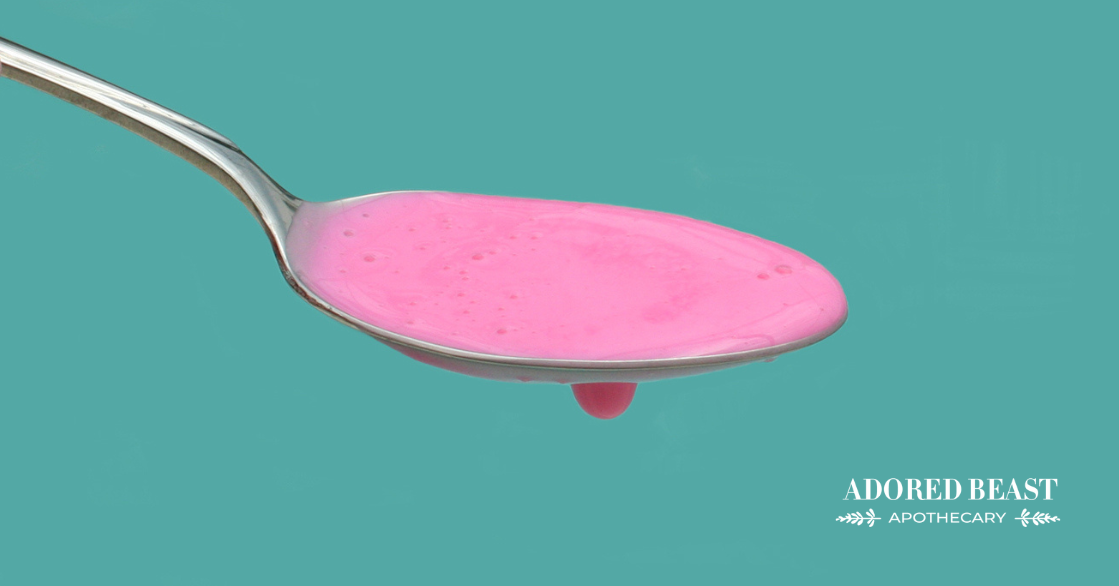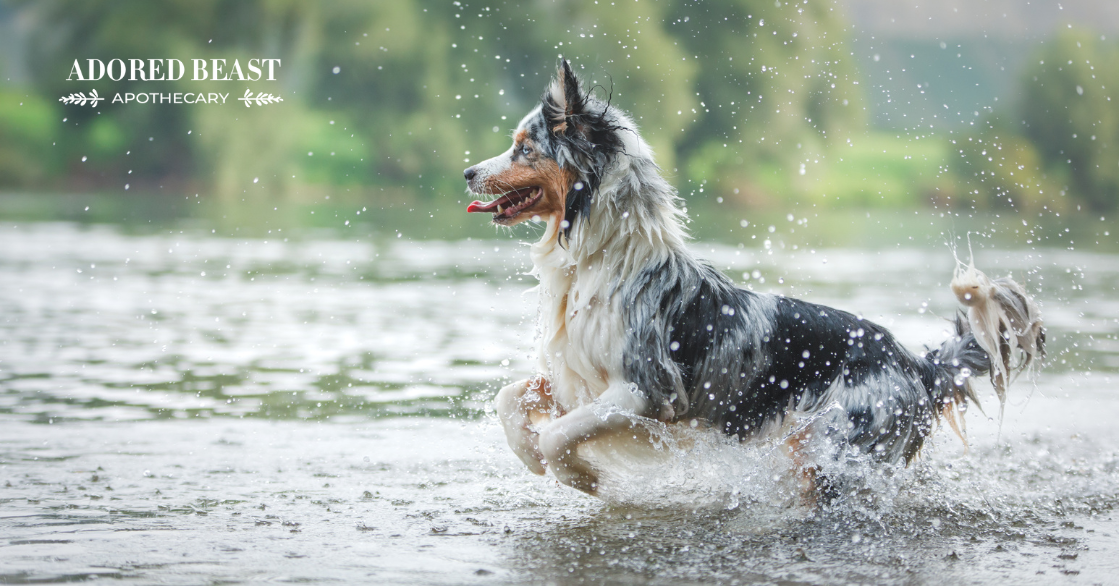Nausea, heartburn, indigestion, upset stomach, diarrhea…
Many of you probably remember the jingle, and if your dog has an upset stomach, you may be tempted to reach for a bottle of Pepto Bismol from your medicine cabinet. After all, it’s a household staple for humans dealing with diarrhea, nausea, and indigestion. In fact, some vets even suggest it.
But is it safe for dogs? Let’s break down the details on Pepto Bismol for dogs: how it works, what’s inside the bottle, the risks for dogs, and natural alternatives that can help soothe their digestive system.
What is Pepto Bismol and How Does It Work?
Pepto Bismol’s active ingredient is bismuth subsalicylate. In humans, it works by:
- Coating the stomach lining to protect it from irritation
- Reducing inflammation in the stomach and intestines
- Slowing down diarrhea by decreasing fluid secretion in the intestines
- Acting as a mild antimicrobial agent
For people, it can bring quick relief from indigestion, nausea, and loose stools. But dogs don’t process medications the same way humans do, and that’s where the concern comes in.
The thing is, that main ingredient (bismuth subsalicylate) is closely related to aspirin (acetylsalicylic acid). This raises two red flags for dogs:
- Salicylates (aspirin-like compounds): Dogs are more sensitive to salicylates than humans. They can cause stomach irritation, ulcers, or even toxicity if given in too high a dose or over time.
- Bismuth: Generally considered less harmful, but it can darken a dog’s stools, making it harder to detect gastrointestinal bleeding or other health issues.
Other concerns include flavourings, sweeteners, or artificial dyes in some formulations, which may upset your dog’s stomach further, or be outright unsafe (like xylitol, which is toxic to dogs, though not usually in Pepto).
Risks of Pepto Bismol for Dogs
Some veterinarians may occasionally recommend Pepto Bismol for dogs in very specific cases and at carefully calculated doses. However, the risks often outweigh the benefits:
- Stomach irritation or ulcers from the salicylate content
- Interference with medications such as steroids, NSAIDs, or blood thinners
- Toxicity if too much is given or if your dog is small, senior, or has underlying health issues
- Black stools, which can mask dangerous conditions like gastrointestinal bleeding
- Misdiagnosis risk—treating diarrhea at home may delay getting veterinary care for serious issues like infections, parasites, or pancreatitis
Because of these risks, most pet health professionals recommend avoiding Pepto Bismol for dogs. We agree.
Safer Alternatives for Digestive Upset in Dogs
Ok, so Pepto is off the table. No problem. If your dog has mild digestive upset, such as a short bout of diarrhea without other concerning symptoms, there are safer, natural ways to support them:
1. Short Fasting Period
Giving your dog’s digestive system a rest is often the best first step. For adult dogs, withholding food for 12–24 hours (but not water) can give the stomach time to settle. For small breeds and seniors, we always recommend much shorter fasting periods, and we don’t ever suggest fasting puppies (or cats).
Here are some other dos and don’ts when it comes to fasting.
2. Slippery Elm
This is one of our absolute faves for tummy troubles – that’s why we put it in our best-selling Gut Soothe. This herb coats the digestive tract, soothing irritation and reducing diarrhea. This is largely thanks to its ability to act as a demulcent. Demulcent plants contain a polysaccharide molecular complex called mucilage. When this mucilage comes in contact with water, it turns into a slimy, gel-like substance. This gel coats the inside of a dog’s digestive tract, lubricating and helping promote mucous secretions. This helps reduce the inflammation within the digestive tract that can cause diarrhea, vomiting, or gastric reflux.
Read more about slippery elm here.
3. Marshmallow Root
Another of our faves for digestive upset! It’s also in Gut Soothe. Like slippery elm, marshmallow root is a demulcent, meaning it forms that protective layer over irritated tissues. It can calm inflammation in the gut and help with both diarrhea and constipation.
Read more about the benefits of marshmallow root in this post.
4. Pumpkin
Pumpkins aren’t just for Halloween Jack-o-Lanterns or pumpkin pie. We keep a jar of pumpkin puree in our cupboard at all times. A spoonful of pure pumpkin is rich in soluble fiber, which helps normalize stools, whether too loose or too firm. It’s also packed with vitamins and minerals, which is helpful when a dog has diarrhea. Plus, it’s really gentle. If you’re feeding it specifically to deal with a bout of diarrhea, start with 1-2 tablespoons and work up to 3-4. Just open a can of pure pumpkin (make sure it isn’t pumpkin pie filling) and plop those scoops on top of regular food (or all on its own). If you want to use fresh pumpkin, that’s perfectly ok too! Just puree it!
5. Probiotics
We always reach for probiotics for gut health – whether it’s on the fritz or to just improve overall health, so it should come as no surprise that it’s on this list. A healthy gut microbiome is key for digestion. Probiotics are live bacteria that live in the body, with particular concentrations in the gut. They can help balance out the gut microbiome and defend against bad bacteria. Probiotics can be beneficial for everything from digestive upset (like diarrhea) and irritable bowl disease (IBD), to allergies and skin health, to supporting immunity and regulating inflammation.
We have several different probiotics at Adored Beast. Here’s how to choose the right one for your dog.
6. Bone Broth
Bone broth is gentle on the stomach and full of nutrients. It increases fluid consumption and offers much-needed nutrients at a time when your pet needs a boost. It also helps maintain gut health, especially for pets with digestive issues; some amino acids in bone broth, particularly one called glutamine, have serious potential for improving digestion.
Want to make it yourself? Here’s our recipe.
While it may be safe for humans, Pepto Bismol for dogs is not the best option, due to the risks of salicylates and masking serious conditions. Instead, focus on safer natural alternatives like slippery elm, marshmallow root, pumpkin, and probiotics, paired with a short fast to let the stomach rest. Good luck!












